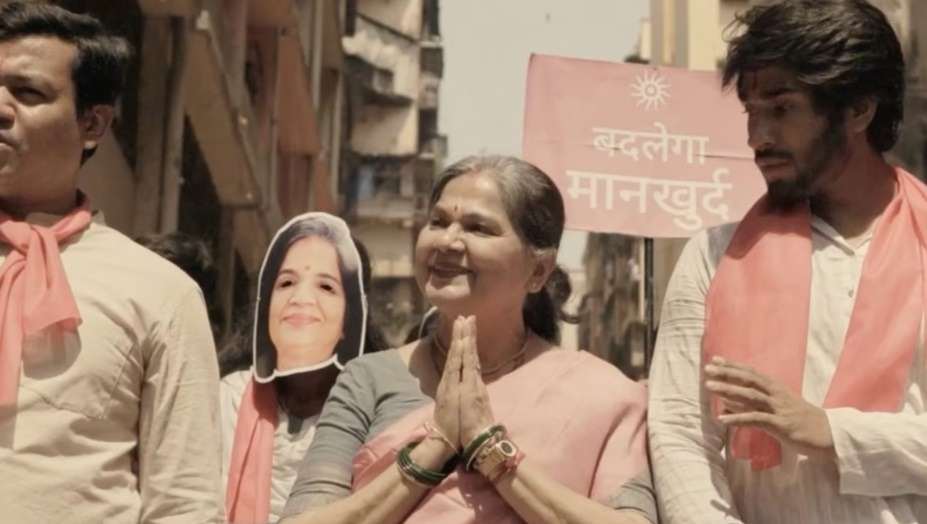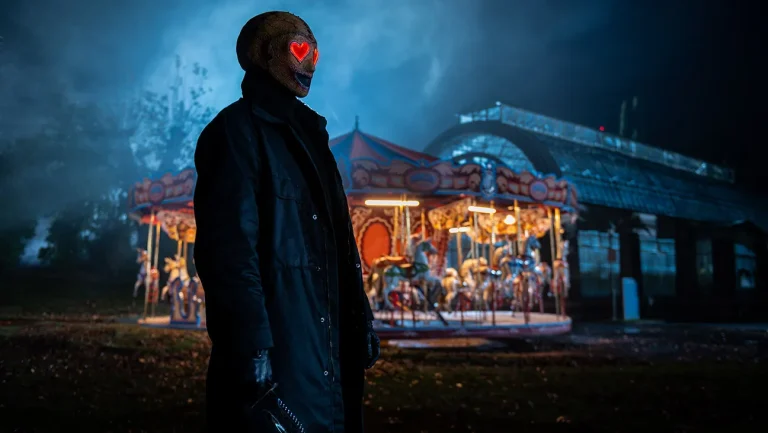“Mankhurd” takes us deep into the heart of eastern Mumbai. Praveen Giri’s debut feature film revolves around the impending elections of the eponymous suburb, where politicians maneuver through the game of power, manipulation, and greed. At the core of this tale is the story of a poor Muslim father-daughter duo who finds themselves accused of a crime that they might not have committed. The film fearlessly delves into the harsh reality that the greatest victories of the affluent often come at the expense of the marginalized. And the thematic significance resonates with the broader issues of political framing, cover-ups, and manipulation prevalent in various corners of India. Giri’s work unflinchingly confronts these issues, highlighting how the powerful exploit the impoverished to build vote banks and secure electoral victories.
However, while “Mankhurd” admirably tackles weighty subjects, it falls short in certain crucial aspects. The absence of powerful performances is glaring, failing to elevate the film’s narrative impact. The writing, too, suffers from a lack of subtlety, mainly relying on characters verbally conveying information that should have organically unfolded visually in the storyline. In one scene, the father tells his daughter about her mother’s passing and how he had used up all his savings to build their home. I wondered why they waited so long to talk about it.
The script doesn’t provide much to connect with the characters either. Apart from a few factual details, such as that the father returned from abroad and now works at a local printing shop and that the daughter wants to pursue her higher studies, there is no ‘personality’ to the characters as such. And when I say that the characters lack personality, I am essentially conveying that they lack the essential element that defines and distinguishes their individuality. Hence, they feel a bit distant, making it hard for us to root for their escape from the tough predicament.
The script also doesn’t thoroughly explore the darker aspects of the political system. There is an attempt at it, but it’s not fleshed out well. There are scenes where people meet each other without providing the viewers a hint of ‘why,’ which does build up a level of suspense. A few montages of election campaigning on all sides give the film the overall flavor of a political drama. And then that’s it. After that, it just leaves us asking for more.

In “Mankhurd,” the elements are there but are very scattered and given undue emphasis. There’s a politician with an agenda whom we don’t see after a while, there are party workers, there is a printing shop and an owner, there are corrupt police officials who appear like stock characters, and there is the father-daughter duo. The narrative exhibited too much of a degree of dispersion, playing along diverse plot points (which could have been interesting sub-plots in the film if done the right way) without a discernible emphasis on a singular aspect to serve as a guiding thread throughout the storyline.
To cite an example, in Arun Karthick’s “Nasir” (2020), the narrative remained centered around a single individual, a shopkeeper. He served as the story’s focal point while various events unfolded in the periphery. There is also an early feeling of that storm that’s coming to cross the way of this average shopkeeper, and Arun Karthick achieves this with a subdued sense of uneasiness that’s created on the backdrop of a boiling political scenario, which is depicted chiefly in the film’s background. Such a restrained atmosphere, which was simmering gradually, was missing in “Mankhurd.” The comparison arises as both films center on the narratives of minority individuals who become victims of their circumstances fueled by the political outrage surrounding them.
One could say “Mankhurd” is essentially a tale about a father and a daughter. However, I’d counter by pointing out that if their accusation is such a crucial element in the story, there should be clues or indications of it from the beginning – just like Chekhov’s Gun needs to be introduced early on in a story before it gets used later. Instead the film relies on occasional news snippets to show what’s happening in the city to capture its mood and inform the viewers. The budget constraints in this regard are very apparent, limiting the movie’s ultimate scope. Furthermore, what’s especially noticeable is the unpolished and awkward quality of certain performances at specific points in the narrative.
Nevertheless, “Mankhurd” exhibits daring subject selection and boldly explores the dynamics between class and religion in contemporary India. Giri’s keen eye for the city and its suburbs is evident, bringing to life the slums, the streets, and the narrow corridors of houses stacked upon each other. The film is able to capture the city in the truest essence of what it had set out to do. The atmosphere of a chaotic Mumbai shown in “Mankhurd” also carries a flavor of Devashish Makhija’s films. Also, in a similar vein, “Mankhurd” brings to light the tale of the marginalized sections of society, providing social commentary with a kind of realism that is tough to create.
Despite its shortcomings, the film presents a decent realist aesthetics. Though lacking the gut-punch impact seen in more dramatic films like Anubhav Sinha’s “Mulk” (2018), the narrative is a noteworthy attempt to shed light on the socioeconomic complexities and hardships the underprivileged face. “Mankhurd” stands as a testament to the director’s potential, leaving audiences with a thought-provoking portrayal of a gritty Mumbai suburb – the city can be more than what it is!


![Sunspot [2022] Review – An Inconsequential Ode to the New American Cinema of the 70s](https://79468c92.delivery.rocketcdn.me/wp-content/uploads/2022/08/Sunspot-2022-Movie-Review-1-768x405.jpg)

![The Atlantic City Story [2020]: ‘IFFI’ Review – A muted character-drama about understanding the aimlessness of existence](https://79468c92.delivery.rocketcdn.me/wp-content/uploads/2021/01/The-Atlantic-City-Story-highonfilms-1-768x432.jpg)

